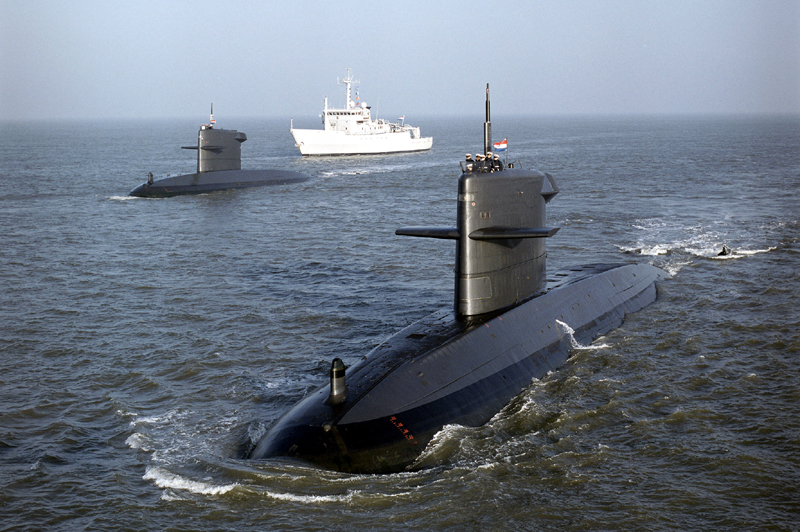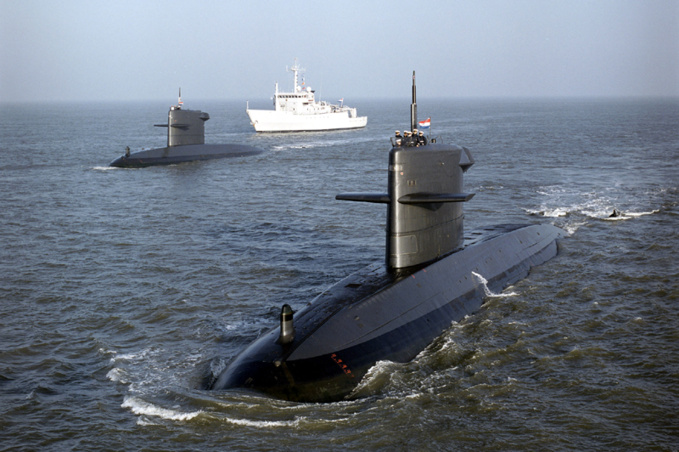The current Dutch submarine fleet is composed of four Walrus-class ships . Home-built in the late 1970s, it proved an efficient and reliable, while basic design, with a solid operational history. As a diesel-electric sub, it represents the traditional technology, as the Netherlands never made the choice to go nuclear. Given that the Dutch are original founders of, and well-integrated into, the Atlantic Alliance, the submarine fleet was never meant as a national defence layer, but more as the Netherland’s contribution to NATO’s defensive surveillance of Europe, and that it did well. NATO reported last year that: “Dutch scientists and experts offered their insights on new ways to address emerging security challenges during a Science for Peace and Security Programme (SPS) Information Day held in The Hague on 15 March 2017. Fruitful cooperation between the Netherlands and NATO’s SPS Programme has already led to exploring common solutions to security challenges in the areas of cyber defense, terrorism, extremism and unexploded ordnance.” Despite their small number and old age, Dutch subs have cut out a reputation throughout the alliance of reliability, and their officers are known for their advanced skills in operating them. Due to its flawless operational attendance and results, the Dutch have carved themselves a sweet spot within NATO, on the submarine front. But after 40 years of operations, replacement day has come for the old Walrus.
The strategic situation for the Netherlands was, at the time of the launching of the Walrus-class submarines, rather similar to what it is now, with a mid-intensity threat coming from the East and from the northern seas. By the time the 1980s unfolded, Russia was in no condition to represent a serious military threat anymore, but could still hold its ground in Europe, wield considerable influence, and play on the European chess board against the alliance. One of the peacetime pre-conflictual levels is submarine intelligence, gathering data on traffic, ship position, convoy directions, not to mention the liability to lie in wait and strike, if need be. The Dutch submarines proved particularly effective in stealth and detection, during those days. During the 1990s, the collapse on the Soviet Empire, the world’s security hot points moved South, towards the Middle East, and the only tension areas in the East, with instability and fragmentation in the Balkans, involved little or no naval forces. Dutch submarines, like their foreign counterparts, were mainly sent on patrols.
But Russia is back in the game , with a huge military build-up, including on the naval front. Once again, NATO will need an effective ally to counter the Russians on the underwater European chessboard, and the Netherlands are keen to get back to the game they were so good at. The Dutch navy scored a peacetime victory in 2011, when it was able to sneak up on Russia’s only aircraft carrier during an exercise, well within firing range. Had the same situation occurred in wartime, the Dutch would have sunk the only aircraft carrier the Russians have, dealing them a war-ending blow. But with the new Russian submarine capabilities, the old Walrus just won’t be up to the new task. Given the small size of the projected fleet, the new units will need to be as multi-role as possible, able to carry out missions ranging from hunting to intelligence gathering, and from special forces deployment to coastal defense. With the Netherland’s commitment both to NATO and to the UE, operational ranges will need to be far-reaching, so as to allow for missions within territorial waters as well as across the globe. The Dutch government is fully aware of this, as reported by BN DeStem Hanneke Keultjes: “Yes, we have really chosen things, because they are badly needed and the NATO attaches to them for example. New manned submarines that can gather intelligence close to the coast and in deep waters. There are not many countries that can. The air force and the army also benefit from that information. That is necessary for everyone”. The replacement ships should arrive during the 2020s.
One of the main criteria for submarines lies in their propulsion system and its ability to provide stealth and range. Nuclear propulsion gives the best performances on those fields. But the Netherlands don’t seem keen to jump the gap into the world of nuclear submarines, whose maintenance needs are far greater. Classic propeller submarines cause highly detectable noise by cavitation, and diesel electrics need to resurface regularly to recharge batteries, making them vulnerable to both surface ships and reconnaissance planes. The Netherlands will probably be turning to submarines equipped with Air-independent propulsion system (AIP) to match their abilities to the Russian ones in the near future. In any event, The Hague’s new strategic layout will demand a leap so great it is virtually bound to look abroad for help on the new submarine project. While domestic industries are excellent, the input of neighboring countries will prove necessary to avoid the program stalling. While the domestic-built Walrus made sense at the time, and served their purpose well, they did come at the cost of budget overshot, and foreign partnerships and expertise will address that risk. The Hague will therefore need to resort to European technological partners, while giving its national industry a large share of the contract.
The best way, according to strategists, to avoid war, is to prepare it. To convince the enemy that any warlike move it could pull would result in immediate demise. Submarines, in this respect, are excellent war-preventers. If Russians find themselves unable to roam Europeans freely, without being detected and monitored by Dutch subs, then the Netherlands will have done much to consolidate the balance of European powers, further securing the country.
The strategic situation for the Netherlands was, at the time of the launching of the Walrus-class submarines, rather similar to what it is now, with a mid-intensity threat coming from the East and from the northern seas. By the time the 1980s unfolded, Russia was in no condition to represent a serious military threat anymore, but could still hold its ground in Europe, wield considerable influence, and play on the European chess board against the alliance. One of the peacetime pre-conflictual levels is submarine intelligence, gathering data on traffic, ship position, convoy directions, not to mention the liability to lie in wait and strike, if need be. The Dutch submarines proved particularly effective in stealth and detection, during those days. During the 1990s, the collapse on the Soviet Empire, the world’s security hot points moved South, towards the Middle East, and the only tension areas in the East, with instability and fragmentation in the Balkans, involved little or no naval forces. Dutch submarines, like their foreign counterparts, were mainly sent on patrols.
But Russia is back in the game , with a huge military build-up, including on the naval front. Once again, NATO will need an effective ally to counter the Russians on the underwater European chessboard, and the Netherlands are keen to get back to the game they were so good at. The Dutch navy scored a peacetime victory in 2011, when it was able to sneak up on Russia’s only aircraft carrier during an exercise, well within firing range. Had the same situation occurred in wartime, the Dutch would have sunk the only aircraft carrier the Russians have, dealing them a war-ending blow. But with the new Russian submarine capabilities, the old Walrus just won’t be up to the new task. Given the small size of the projected fleet, the new units will need to be as multi-role as possible, able to carry out missions ranging from hunting to intelligence gathering, and from special forces deployment to coastal defense. With the Netherland’s commitment both to NATO and to the UE, operational ranges will need to be far-reaching, so as to allow for missions within territorial waters as well as across the globe. The Dutch government is fully aware of this, as reported by BN DeStem Hanneke Keultjes: “Yes, we have really chosen things, because they are badly needed and the NATO attaches to them for example. New manned submarines that can gather intelligence close to the coast and in deep waters. There are not many countries that can. The air force and the army also benefit from that information. That is necessary for everyone”. The replacement ships should arrive during the 2020s.
One of the main criteria for submarines lies in their propulsion system and its ability to provide stealth and range. Nuclear propulsion gives the best performances on those fields. But the Netherlands don’t seem keen to jump the gap into the world of nuclear submarines, whose maintenance needs are far greater. Classic propeller submarines cause highly detectable noise by cavitation, and diesel electrics need to resurface regularly to recharge batteries, making them vulnerable to both surface ships and reconnaissance planes. The Netherlands will probably be turning to submarines equipped with Air-independent propulsion system (AIP) to match their abilities to the Russian ones in the near future. In any event, The Hague’s new strategic layout will demand a leap so great it is virtually bound to look abroad for help on the new submarine project. While domestic industries are excellent, the input of neighboring countries will prove necessary to avoid the program stalling. While the domestic-built Walrus made sense at the time, and served their purpose well, they did come at the cost of budget overshot, and foreign partnerships and expertise will address that risk. The Hague will therefore need to resort to European technological partners, while giving its national industry a large share of the contract.
The best way, according to strategists, to avoid war, is to prepare it. To convince the enemy that any warlike move it could pull would result in immediate demise. Submarines, in this respect, are excellent war-preventers. If Russians find themselves unable to roam Europeans freely, without being detected and monitored by Dutch subs, then the Netherlands will have done much to consolidate the balance of European powers, further securing the country.



















